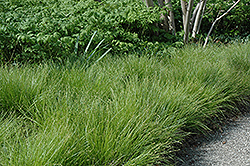Height: 18 inches
Spread: 18 inches
Sunlight:
![]()
![]()
![]()
Hardiness Zone: 4
Other Names: Straight-Styled Wood Sedge
Description:
Grown for delicate, soft green clumps of extremely fine hair-like foliage that gently wave in a breeze; great in a moist border in shade or sun, doesn't like to dry out
Ornamental Features
Eastern Star Sedge is primarily valued in the garden for its cascading habit of growth. Its small grassy leaves are emerald green in color. The foliage often turns brown in fall.
Landscape Attributes
Eastern Star Sedge is a dense herbaceous evergreen perennial grass with a shapely form and gracefully arching stems. It brings an extremely fine and delicate texture to the garden composition and should be used to full effect.
This plant will require occasional maintenance and upkeep, and is best cleaned up in early spring before it resumes active growth for the season. Gardeners should be aware of the following characteristic(s) that may warrant special consideration;
- Spreading
Eastern Star Sedge is recommended for the following landscape applications;
- Mass Planting
- Border Edging
- General Garden Use
- Groundcover
- Naturalizing And Woodland Gardens
- Container Planting
Planting & Growing
Eastern Star Sedge will grow to be about 18 inches tall at maturity, with a spread of 18 inches. Its foliage tends to remain dense right to the ground, not requiring facer plants in front. It grows at a medium rate, and under ideal conditions can be expected to live for approximately 10 years. As an evegreen perennial, this plant will typically keep its form and foliage year-round.
This plant performs well in both full sun and full shade. It prefers to grow in moist to wet soil, and will even tolerate some standing water. It is not particular as to soil type or pH. It is somewhat tolerant of urban pollution. This species is native to parts of North America. It can be propagated by division.
Eastern Star Sedge is a fine choice for the garden, but it is also a good selection for planting in outdoor pots and containers. It is often used as a 'filler' in the 'spiller-thriller-filler' container combination, providing the canvas against which the thriller plants stand out. Note that when growing plants in outdoor containers and baskets, they may require more frequent waterings than they would in the yard or garden.
